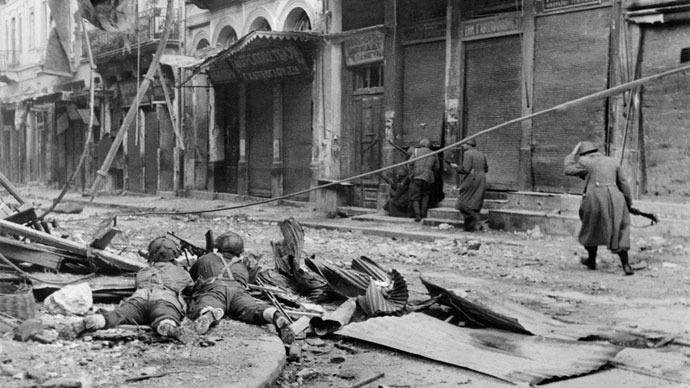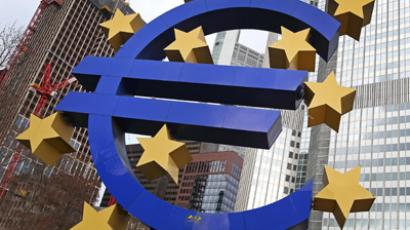Payback: Greek govt to launch legal battle for new WWII reparations from Germany

Greece has officially declared it will seek reparations from Germany dating back to the Nazi occupation during World War II, which could amount to over €100 billion, likely putting further strain on relations between the two Eurozone countries.
"We will exhaust every means available to arrive at a settlement," Greek Foreign Minister Dimitris Avramopoulos told parliament in Athens on Wednesday. "One can't compare the times, but also one cannot erase the memories."
A Greek Finance Ministry report leaked to local media earlier this month showed that Greece believes that Berlin owes it €162 billion – €108 billion for infrastructure damage during the occupation between 1941 and the end of the war, and €54 billion as compensation for an interest-free loan Germany took from the country to support its war effort.
If paid in full, the sum would nearly empty the national currency and gold reserves of Germany (€185 billion as of last month), though this would still not be enough to cover Greece’s national debt (over €350 billion).
Demands for such a reparation scheme have been voiced intermittently by Greek politicians over the past 60 years, but have gained renewed energy amid the recent financial crisis, in which the country has been subjected to tough austerity measures in exchange for largely German-backed loans.
The latest campaign is driven by radical Socialist opposition leader Alexis Tsipras, and is supported by 4 out of 5 Greeks, according to polls.
It remains unlikely that Germany will part with the money voluntarily.

“Instead of misleading the people in Greece [about the possibility of reparations] it would be better to show them the road to reform,” German Finance Minister Wolfgang Schäuble said when the numbers in question first surfaced several weeks ago. “The issue was settled a long time ago. Paying reparations is out of the question.”
In his speech, Avramopoulos said the “Greek people suffered, went hungry and were looted like no other country,” and few contest that alongside the Soviet Union, Poland and parts of the Balkans, Greece was the hardest-hit of the invaded countries during World War II.
Still, the legal avenues open to the Greek government seem limited.
In the aftermath of the war, Greece was awarded provisional
reparations amounting to a present-day value of about $2.5
billion.
Later, the 1953 London Debt Agreement – in which around half of
Germany’s external debt was written off – stipulated that Greece
would demand no further reparations until the unification of
Germany. When the two German republics finally reunified in 1990,
Greece conceded that it had no further claims.
In 1960, Germany also compensated Greeks who suffered under the Nazis.
While anti-German protests – including some that portray Chancellor Angela Merkel as a mustachioed Nazi – have become a staple of Greek political life, and set off what the media has labeled a ‘new Cold War’ between the countries.

The demand for reparations is apparently not just about a thirst for retribution, or even necessarily a chance to retake money from Germany: as numerous historians in both countries have pointed out, the London Debt Agreement was made because Germany couldn’t pay its debts without crippling its future. Forgiving these debts set the scene for Germany’s ‘economic miracle’ in the following decade.
Similarly, Greece’s current debts are about one-and-a-half times
its Gross Domestic Product. Media commentators in Athens have
repeatedly pointed to the historic parallels, and say that it is
now Germany’s chance to allow Greece a better future, instead of
suffocating it with obligations it can never repay.














